Key takeaways:
- News can evoke emotional responses that may lead to hasty trading decisions; pausing to assess market sentiment is essential for thoughtful trading.
- Understanding the nuances of news language and sentiment is crucial for predicting market reactions and adjusting trading strategies accordingly.
- Evaluating the credibility and relevance of news sources helps mitigate risks; gut instincts can also play a significant role in making informed trading decisions.
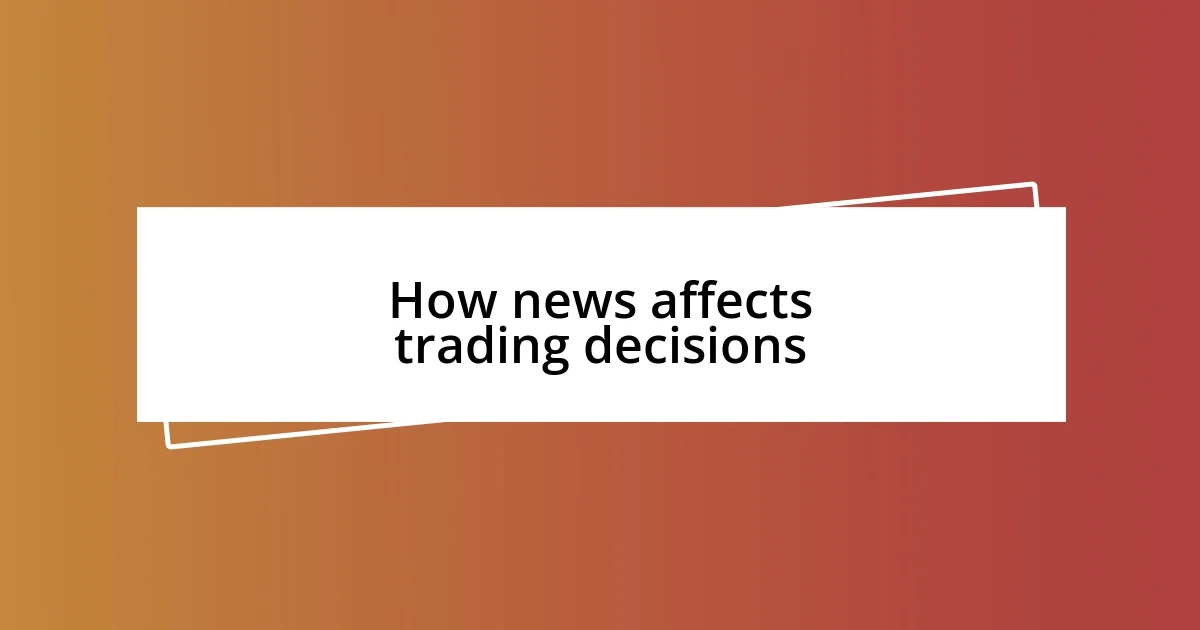
How news affects trading decisions
I’ve often found that news acts as a double-edged sword in the trading world. For instance, when a major company’s earnings report exceeded expectations, I felt that initial surge of excitement. That rush is thrilling, but it can also cloud judgment; I’ve learned to pause and assess the market sentiment before diving into trades based solely on news.
When geopolitical events unfold suddenly, I’ve seen how they can send shockwaves through the market. I remember one morning, waking up to headlines about escalating tensions in a region central to oil production. My heart raced as I rushed to analyze how such news could impact energy stocks. It’s a rollercoaster of emotions—fear, anticipation, and the anxiety of making split-second decisions.
It begs the question: how do we balance the immediate reactions to news with the need for strategic planning? From my experience, taking a step back to assess the broader implications often leads to more thoughtful trading decisions. Relying solely on headlines can lead to hasty actions, while a measured response allows me to navigate the volatility more effectively.
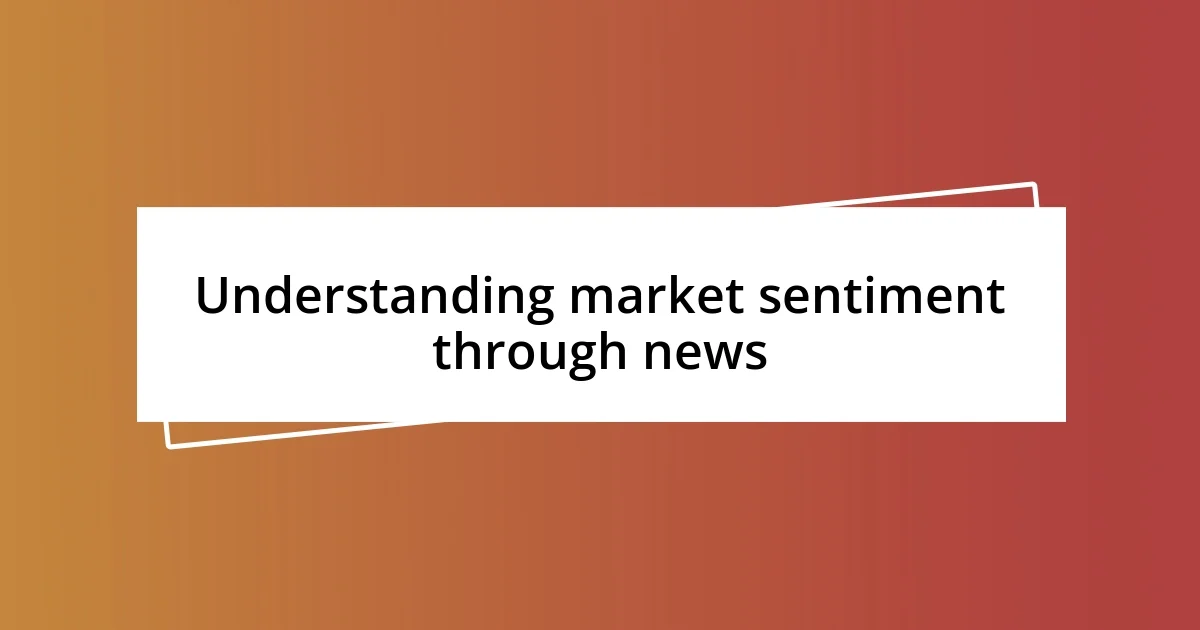
Understanding market sentiment through news
Understanding market sentiment through news is a nuanced process. I’ve observed that news can often sway investor emotions, leading to a surge or drop in stock prices. For instance, after a central bank’s interest rate decision, I’ve watched the market react almost instantly, which highlights how quickly sentiment can shift based on new information. It’s fascinating how investor psychology intertwines with factual reporting.
Additionally, I recall a time when a particular tech stock faced backlash due to data privacy concerns. Even reading through the coverage, I could feel an undercurrent of fear ripple through discussions online. This is where understanding sentiment becomes crucial—by gauging these emotional responses, I’ve learned to identify potential price movements and adjust my trades accordingly. Recognizing that fear often leads to overreactions lets me strategize effectively, rather than follow the herd out of panic.
As I dive deeper into analyzing news impacts, I find myself constantly monitoring social media trends and financial news outlets. These platforms become my emotional barometers, offering insights into how others perceive news. It’s almost like tuning into a collective heartbeat of the market; the more I listen, the better I can sense where sentiment is heading, ultimately guiding my trade decisions with greater confidence.
| Factor | Impact on Market Sentiment |
|---|---|
| Positive Earnings Reports | Excitement and optimism in trading |
| Geopolitical Tensions | Fear of volatility; potential sell-offs |
| Central Bank Announcements | Immediate market reactivity; shifts in investor confidence |
| Data Privacy Concerns | Heightened anxiety; potential long-term stock decline |
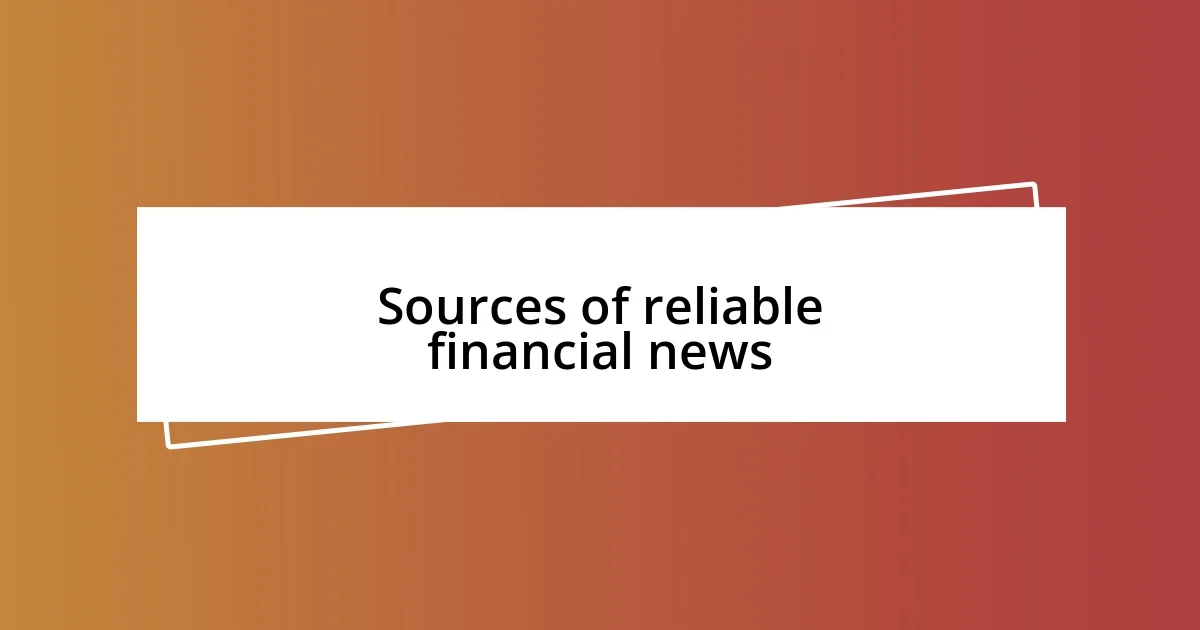
Sources of reliable financial news
In identifying reliable financial news sources, I’ve found that credibility is essential. Over the years, I tend to lean towards established platforms renowned for their thorough analysis and timely updates. For instance, I often check out Bloomberg or Reuters, feeling reassured by their reputation for accuracy. These sources not only provide breaking news but also offer in-depth insights that help me understand underlying trends.
- Bloomberg: Offers comprehensive coverage with expert analysis.
- Reuters: Known for quick updates and fact-based reporting.
- CNBC: Provides not only news but also interviews with market leaders.
- Financial Times: Great for in-depth articles and global financial news.
- Wall Street Journal: Offers detailed business reporting with analytical pieces.
I once came across a rumor on a lesser-known site claiming a major merger; it turned out to be completely unfounded. That experience taught me the value of cross-referencing information to ensure reliability. In my trading journey, I’ve learned that the best news sources are those that aren’t just about speed but offer balanced perspectives, allowing me to make informed decisions without getting swept up in sensationalism.
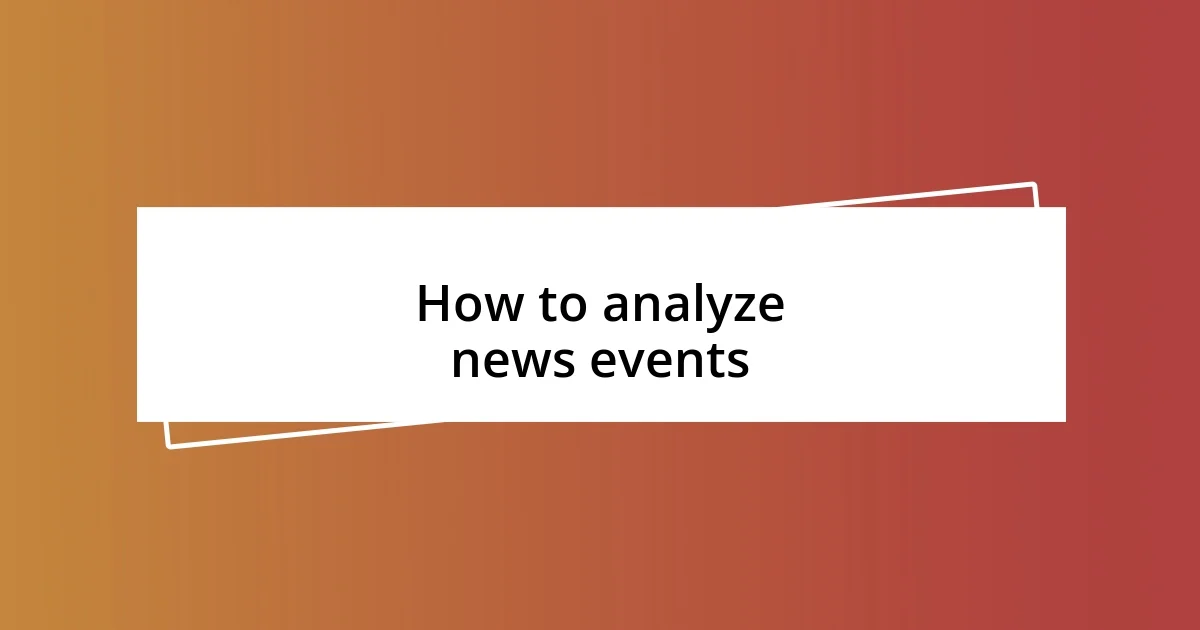
How to analyze news events
When I analyze news events, I often start by breaking down the core message. Is it a significant economic policy change, a corporate earnings announcement, or a geopolitical crisis? Each of these categories can evoke different market reactions. For instance, I remember when a major bank released a surprisingly strong earnings report. I quickly scanned the headlines and social media chatter, noting an immediate surge in optimism. This taught me the importance of contextualizing information; understanding the specifics helps to predict how the market might react.
I also pay attention to the language used in news reports. Is the tone optimistic, fraught with concern, or neutral? I recall a day when analysts discussed rising inflation rates. Their cautious wording immediately struck a chord with me. I could sense the underlying anxiety among traders. By tuning into these nuances, I learned to gauge the potential for panic selling or buying frenzies, allowing me to make more strategic trade decisions rather than reacting emotionally.
Additionally, I sometimes jot down my own thoughts after reading an article or report. Reflecting on my initial impressions helps me clarify what I really think about a news event’s impact. Have you ever found yourself initially excited about a stock only to later feel uncertain? That’s where self-reflection comes into play. Take the time to explore how specific news events align with your trading strategy, as this can bring clarity to your next moves in a fast-paced market.
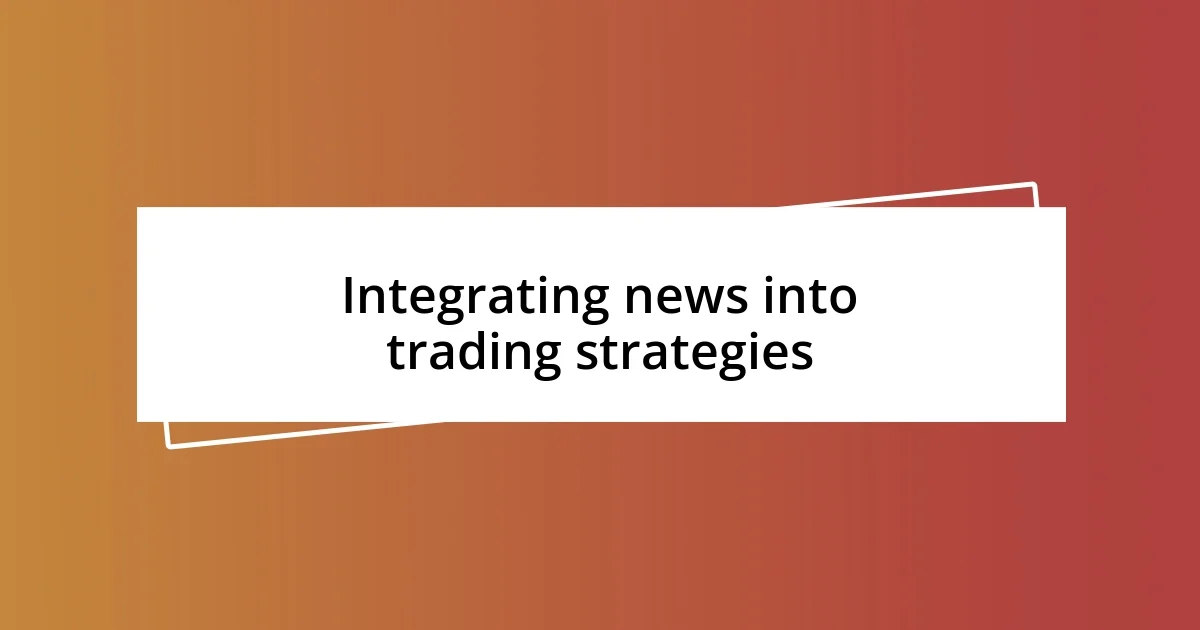
Integrating news into trading strategies
Often, I incorporate news into my trading strategies by setting up alerts for economic indicators that directly affect my positions. For example, when the employment report is released, I make sure to pay close attention. I recall one trade I executed after a particularly robust job report. The exuberance in the market was palpable, and I jumped in just as the stock prices were beginning to rise. It was thrilling to see how quickly my research paid off, reaffirming the connection between news and market movement.
In my experience, integrating news requires a proactive mindset. I routinely assess my trades in light of recent headlines. Have you ever been blindsided by an unexpected event? I once held a position in a tech stock when a major regulatory change was announced. That realization pushed me to adjust my strategy to mitigate potential losses in similar situations moving forward. The lesson? Staying updated can help you anticipate market shifts and adjust your trades accordingly.
Moreover, I like to discuss news developments with fellow traders. This exchange of ideas often sheds light on perspectives I hadn’t considered. For instance, I remember a lively debate about an earnings report where opinions varied widely. Some were optimistic, while others were skeptical. Engaging in such conversations not only helps validate my thoughts but often leads to new insights that shape my trading decisions. Isn’t it interesting how different viewpoints can challenge and refine your strategies?
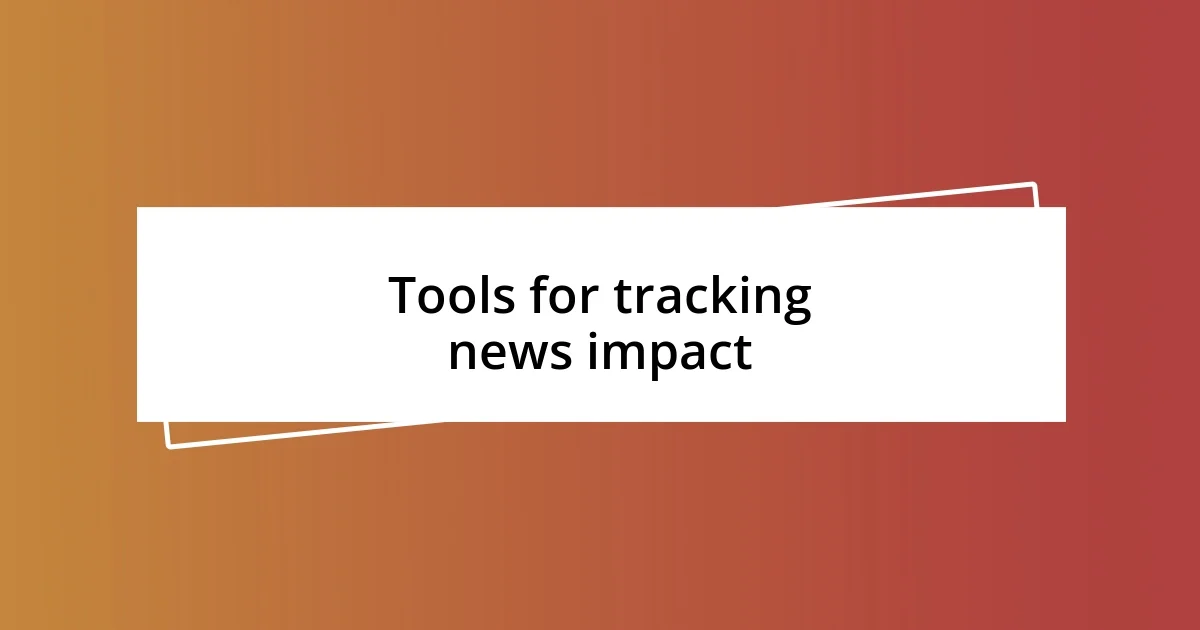
Tools for tracking news impact
When it comes to tracking news impact, I rely on a few key tools that really make my trading decisions easier. For instance, I often turn to economic calendars to stay ahead of important events. I remember the time I checked an upcoming Federal Reserve meeting scheduled for the week, and I realized it could shift investor sentiment overnight. It’s a game changer to have that information at my fingertips, allowing me to prepare my trades in advance.
Social media monitoring is another powerful tool in my arsenal. Platforms like Twitter can provide real-time insights into market sentiment and breaking news before it even hits mainstream media. I distinctly recall when a sudden tweet from an influential analyst sent a tech stock soaring within minutes. That day, I jumped on the opportunity, and it reinforced my belief that understanding the pulse of the market often comes from these digital discussions. Have you ever found a gem of information in an unexpected place? Those moments are priceless.
Lastly, I often incorporate sentiment analysis tools that gauge how the market feels about specific news. These tools quantify emotions and help me determine whether traders are feeling bullish or bearish. For example, after analyzing a report using sentiment metrics, I discerned a wave of optimism following a major merger announcement. Trusting those indicators allowed me to enter a position that paid off handsomely. Isn’t it fascinating how numbers and emotions intertwine in trading? Embracing a mix of data and sentiment has certainly elevated my approach.

Evaluating news credibility and relevance
Evaluating the credibility of news sources is crucial for my trading decisions. I typically ask myself: Is this news coming from a reputable outlet? I find it helpful to cross-check information across multiple sources. For instance, I once noticed conflicting reports about a company’s earnings. By comparing articles from well-known financial publications and contrasting them with lesser-known blogs, I was able to discern which provided a more reliable story.
Additionally, I consider the relevance of the news to my specific trades. Some news might be sensational but not particularly impactful in a market context. I distinctly remember a day dominated by headlines about a celebrity’s actions impacting a stock. While many traders were buzzing, I took a step back, realizing that this excitement would likely fade quickly. Understanding what truly influences stock movements helps me avoid unnecessary noise.
Finally, I trust my instincts when evaluating news. Sometimes, a gut feeling will guide me on whether an event will have significant market implications. I recall an instance where I sensed that geopolitical tensions would sway oil prices. The day I decided to act based on my intuition, the market responded just as I anticipated. Have you ever felt that compelling urge to act that ultimately led to a favorable outcome? I believe embracing that instinctual aspect of trading can be quite revealing.














